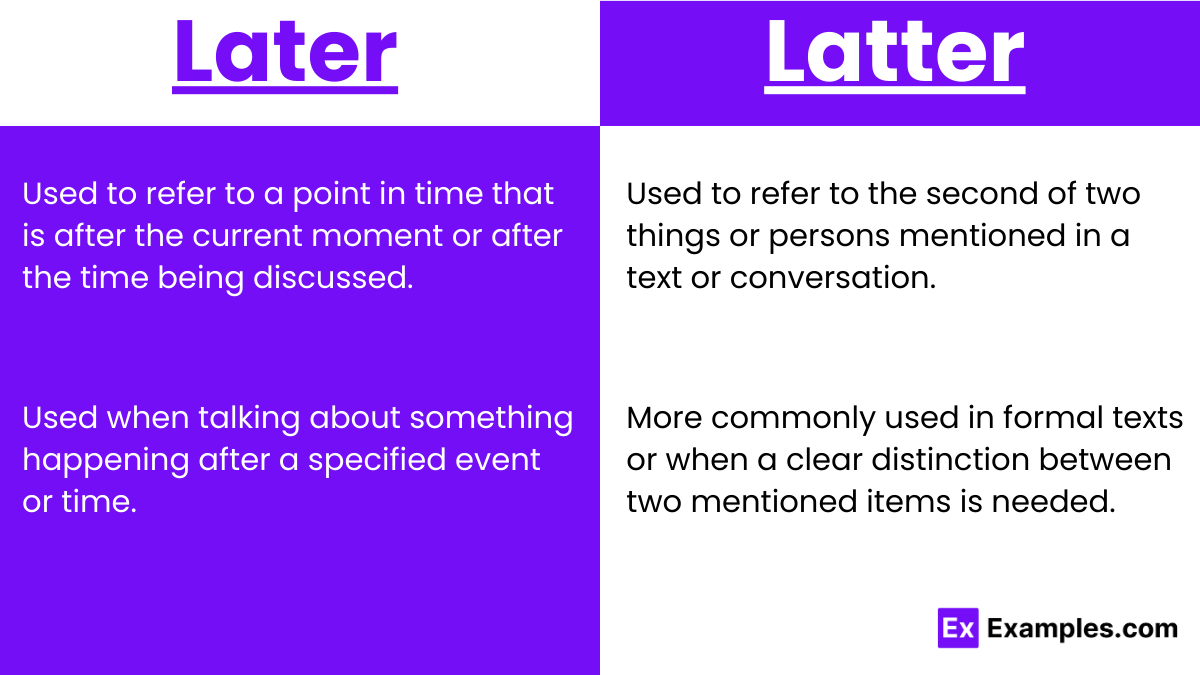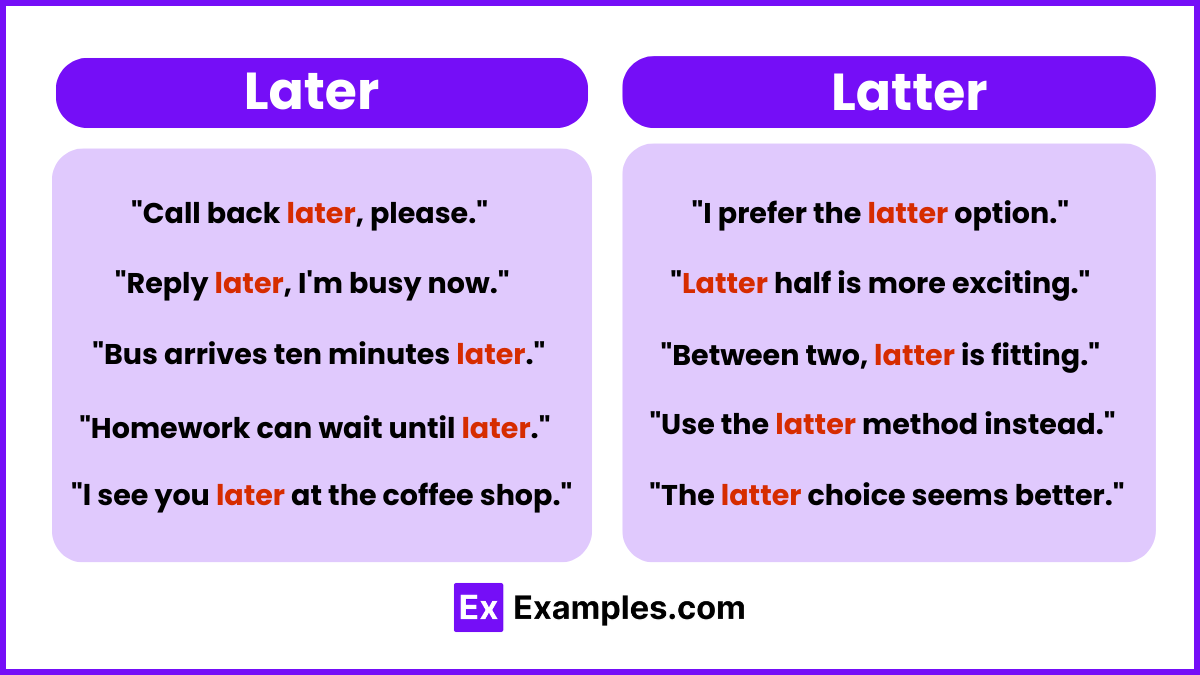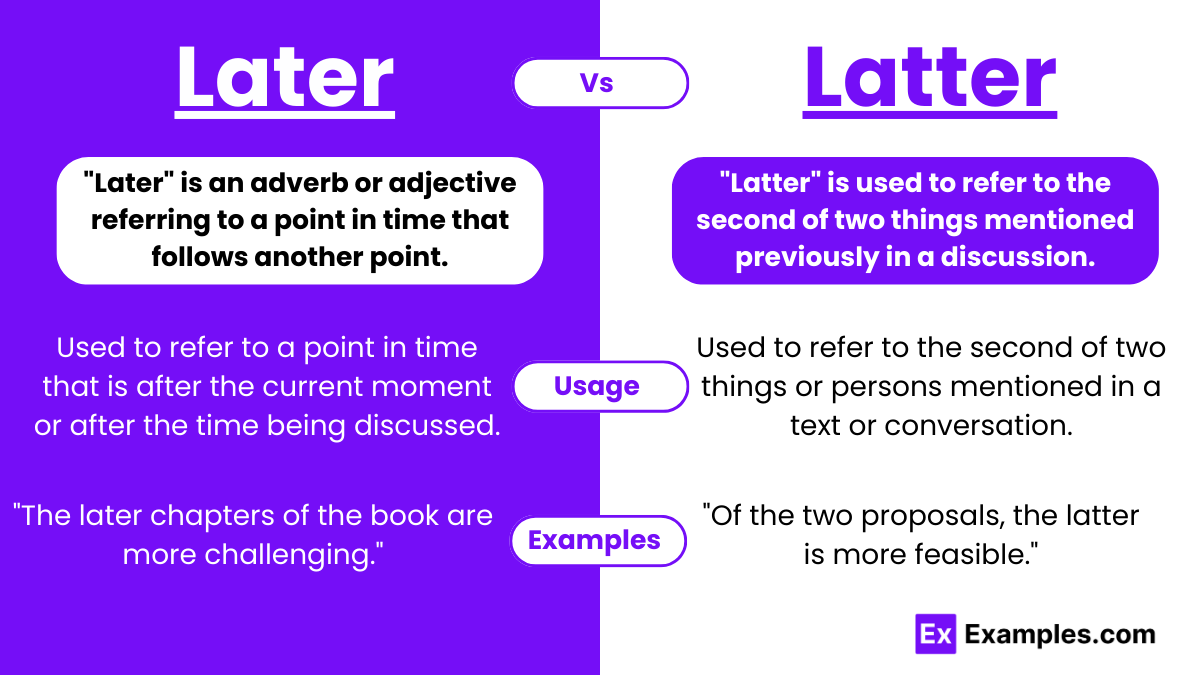Later vs Latter – Meanings, Difference, Examples, Usage.
Understanding the nuances of the English language can be challenging, particularly when dealing with homophones—words that sound alike but have different meanings and spellings. These words are prime examples of such words, often leading to confusion and misuse. “Later” refers to a point in time in the future, while “latter” is about choosing the second of two options. Let’s demystify these commonly confused words and make your communication clearer.
Later and Latter – Meanings
- Later: “Later” is an adverb or adjective referring to a point in time that follows another point. It indicates a subsequent time or a time after the present or after the time being discussed.
- Latter: “Latter” is an adjective used to refer to the second of two things or persons mentioned previously in a discussion. It is often used in contrast with “former,” which refers to the first of two mentioned.
Summary
“Later” refers to a point in time subsequent to another, often used to indicate something that will happen in the future or after a given moment. For example, “I’ll finish my work later today.” On the other hand, “latter” is used to specify the second of two things or persons mentioned. For instance, in the sentence “Between tea and coffee, I prefer the latter,” “latter” refers to coffee, assuming it was mentioned second.
How to Pronounce Later and Latter
- Later: Pronounced as /ˈleɪtər/ (lay-ter).
- Latter: Pronounced as /ˈlætər/ (lat-er).
Differences between Later and Latter
| Aspect | Later | Latter |
|---|---|---|
| Basic Use | Indicates a subsequent time or period after the current one. | Refers to the second of two items or people mentioned. |
| Context | Time-related discussions, to describe something happening after a given point. | Used to differentiate between two mentioned things, focusing on the second item. |
| Usage | Commonly used in everyday speech and writing. | Less common, mainly used in formal writing or when comparing two specific items. |
| Example | “I will see you later.” | “Between chocolate and vanilla, I prefer the latter.” |
How to Remember the Difference between Later and Latter
- Later is related to time. Think of “later” in the day or “later” in the future.
- Latter is about the latter part or the second of two things mentioned. It’s helpful in making a choice or distinction between two options.
When to Use Later and Latter

Usage of Later
- Use “later” to refer to a point in time that is after the current moment or after the time being discussed.
- Future Events or Actions: For discussing future events or actions.
- Subsequent Occurrences: When talking about something happening after a specified event or time.
- Comparative Discussions: In comparative forms (e.g., “later editions of the book”) to discuss versions or releases that follow others.
Usage of Latter
- Use “latter” to refer to the second of two things or persons mentioned in a text or conversation.
- Making Choices: When clarifying a preference between two options.
- Comparisons: In discussions where two items, concepts, or individuals are being compared, and it is necessary to refer back to one of them, specifically the second one mentioned.
- Formal Writing: More commonly used in formal texts or when a clear distinction between two mentioned items is needed.
Later and Latter – Examples

Later Examples
- “We can discuss this matter later, after the meeting.”
- “I plan to visit Rome later this year.”
- “The later chapters of the book are more challenging.”
- “She will call you later tonight.”
- “The software update will be available later this month.”
Latter Examples
- “Between the beginning and the latter part of the movie, I enjoyed the latter more.”
- “In the debate between heart and mind, I tend to follow the latter.”
- “Of the two proposals, the latter is more feasible.”
- “The book covers many topics, but I am particularly interested in the latter chapters.”
- “He mentioned John and Peter, but it was the latter who won the award.”
Synonyms
| Later | Latter |
|---|---|
| Afterwards | Second |
| Subsequently | Ending |
| Eventually | Final |
| In the future | Last mentioned |
| At a later time | Following |
Exercise
- We will discuss the budget adjustments _______ in the meeting.
- Of the two strategies presented, the _______ seems more aligned with our goals.
- Could you send me the report _______ today?
- In the comparison between manual and digital processes, the _______ offers more efficiency.
- I need to finish some work now; can we talk about this _______?
Answers
- later
- latter
- later
- latter
- later
FAQ’S
Is it later date or latter date?
Later date is correct when referring to a time in the future. “Latter date” is incorrect in this context.
What is the difference between later and later on?
Later refers to a future time, while later on implies an unspecified time in the near future.
How do you use latter in a sentence?
Latter is used to refer to the second of two things or persons mentioned: “Of tea and coffee, I prefer the latter.”
When someone says later, how long is that?
Later is vague, ranging from a few hours to days, depending on context.
What is the meaning of later on?
Later on means at a time in the future or after the time you have mentioned.
Why do we use later?
Later is used to indicate a time in the future or after the present time.


